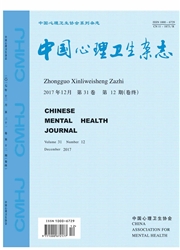

 中文摘要:
中文摘要:
目的:考察感恩、负债感、快乐3种情绪状态对助人行为的作用及其差异。方法:选取河南某高校3个班的190名大学生,采用感恩、负债感、快乐3种情景实验来激发被试的相应情绪,每班随机接受一种情景实验,采用人性的哲学量表(PHN)中的利他主义分量表、自编的助人和主动助人测评工具测量大学生的利他观念、助人和主动助人行为,采用协方差分析和回归分析对数据进行统计处理。结果:在助人和主动助人上,协变量利他观念的效果显著[F(1,186)=9.24、10.52,均P〈0.01];情绪状态的主效应显著[F(2,186)=3.50、3.45,均P〈0.05]。进一步多重事后比较发现,感恩状态下被试的助人和主动助人行为得分均高于快乐状态下的得分[(4.21±0.10)vs.(3.86±0.09),(4.22±0.09)vs.(3.90±0.08)]。回归分析结果显示,感恩能正向预测助人和主动助人行为(β=0.33、0.20),快乐能正向预测主动助人行为(β=0.16)。结论:排除利他观念的影响后,感恩状态下的被试比快乐状态下的被试表现出更多的助人和主动助人行为,感恩比快乐更有助于助人行为的培养。
 英文摘要:
英文摘要:
Objective: To test the effects and differences of gratitude,indebtedness and happiness on people's helping behaviors. Methods: Totally 190 college students from 3 classes in Henan Province were selected. Three situational experiments of gratitude, indebtedness and happiness were used to inspire participants ' mood accordingly. Each class randomized to receive a situational experiment,the altruism subscales of Philosophies of Human Nature( PHN),the assessment tool of helping others and helping others voluntarily were used to measure the college students' altruistic idea,helping others and helping behavior voluntarily,and the methods of descriptive statistics,covariance analysis and regression analysis was adopted. Results: In helping others and helping others voluntarily,according to the results of covariance analysis,the effect of covariate altruistic ideas was significant [ F( 1,186) =9. 24,10. 52; Ps 0. 01],and the main effect of emotional state was also significant[ F( 2,186) = 3. 50,3. 45; Ps 0. 05]. The scores of helping others and helping others voluntarily were higher in the gratitude group than in the happiness group[( 4. 21 ± 0. 10) vs.( 3. 86 ± 0. 09),( 4. 22 ± 0. 09) vs.( 3. 90 ± 0. 08) ]. Regression analysis showed that gratitude could positively predict helping others and helping others voluntarily( β = 0. 33,0. 20),and happiness could positively predict helping others voluntarily( β = 0. 16). Conclusion: Excluding the effect of altruism idea to helping others and helping others voluntarily,the effects of emotional state to helping others and helping others voluntarily are all significant. It suggests that participants under the state of gratitude could showmore helping others and helping others voluntarily than participants under happiness,that is to say,comparing with happiness,gratitude may be more conducive to the cultivation of helping behavior.
 同期刊论文项目
同期刊论文项目
 同项目期刊论文
同项目期刊论文
 期刊信息
期刊信息
